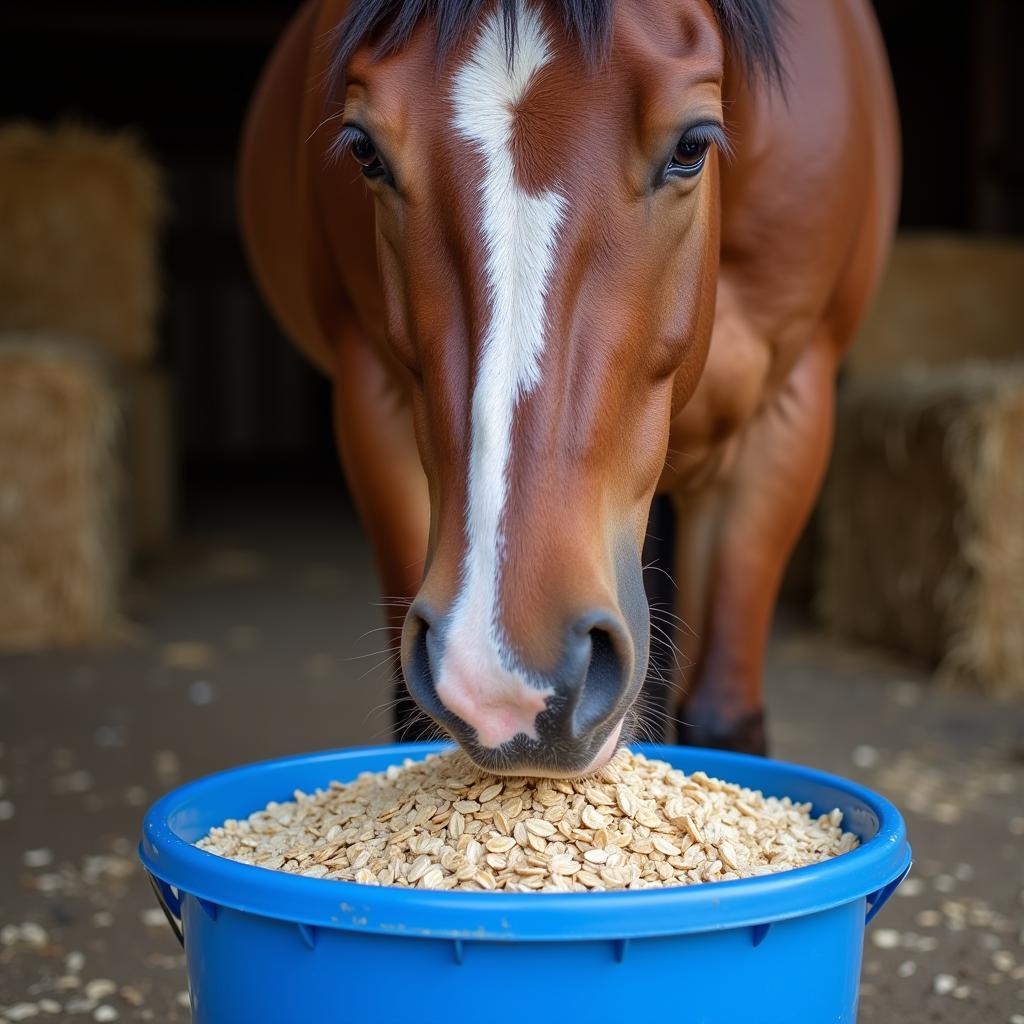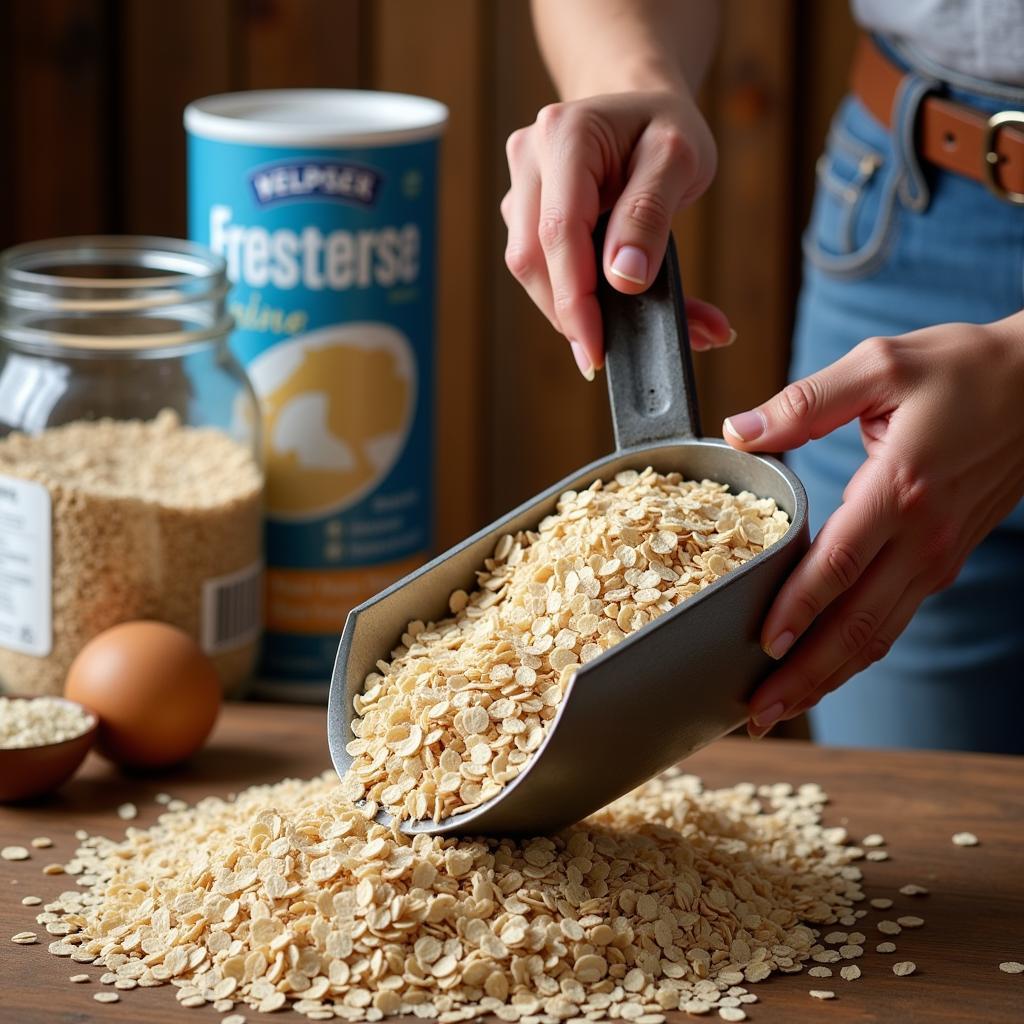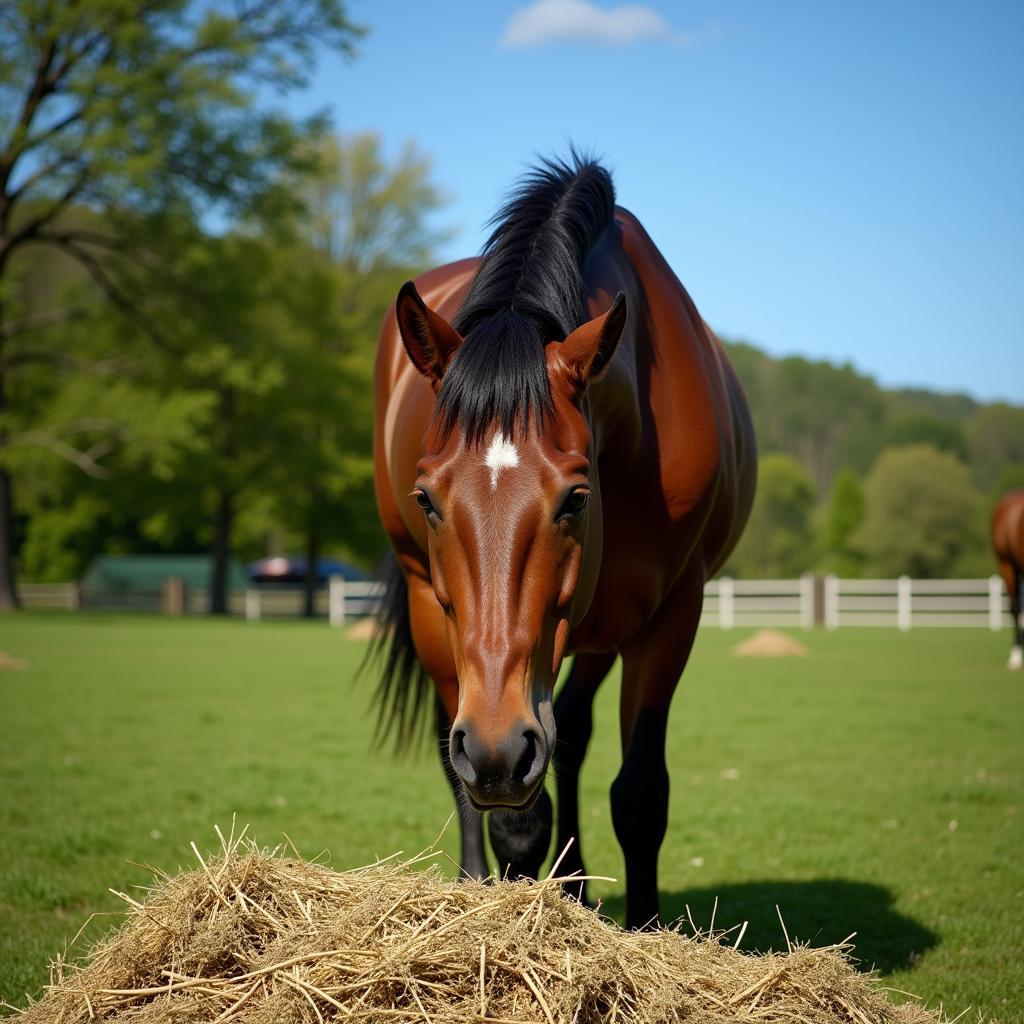Oats Feed For Horses has been a staple in equine diets for centuries. But are oats always the best choice? This comprehensive guide will delve into the nutritional benefits, potential drawbacks, and best practices for feeding oats to your horse. We’ll explore various aspects of incorporating oats into your horse’s diet, ensuring you have all the information needed to make informed decisions about their nutritional needs.
Are oats a good source of energy for horses? Absolutely! Oats are a good source of energy and fiber, essential for maintaining a healthy digestive system. They are also palatable, meaning most horses enjoy their taste. Read on to learn more about feeding your horse oats for horses.
The Nutritional Benefits of Oats for Horses
Oats provide several essential nutrients, including carbohydrates for energy, fiber for digestive health, and protein for muscle development. They are also a good source of vitamins and minerals, such as vitamin B, manganese, and zinc. The fiber content in oats helps regulate the digestive tract and prevent colic, a common and potentially serious equine health issue. Additionally, the relatively low sugar and starch content compared to other grains makes oats a safer option for horses prone to metabolic issues. However, it’s crucial to remember that not all oats are created equal. The quality of oats can vary significantly, affecting their nutritional value.
What makes oats easily digestible for horses? The fibrous hull of the oat grain promotes healthy digestion and helps prevent colic.
Choosing the Right Oats for Your Horse
When selecting oats feed for horses, look for high-quality, clean oats that are free from mold, dust, and foreign materials. Whole oats are generally preferred over rolled or crimped oats as they retain more of their nutritional value and provide more chewing time, which benefits dental health. However, older horses or those with dental problems might benefit from processed oats that are easier to chew and digest. Always store oats in a cool, dry place to prevent spoilage and maintain their quality. Inspect your oats regularly for any signs of mold or infestation.
Is there a difference between whole oats and processed oats for horses? Yes, whole oats are generally preferable, but processed oats can be beneficial for older horses or those with dental issues. For a comparison of different horse feeds, check out Triple Crown Naturals pelleted horse feed.
 Horse Enjoying Oats from a Bucket
Horse Enjoying Oats from a Bucket
How Much Oats Should You Feed Your Horse?
The amount of oats you should feed your horse depends on various factors, including their age, weight, activity level, and overall health. As a general guideline, oats should not exceed 50% of your horse’s total grain ration. It’s crucial to introduce oats gradually into your horse’s diet to avoid digestive upset. Start with a small amount and gradually increase the portion over several days or weeks, monitoring your horse for any adverse reactions. Always consult with a veterinarian or equine nutritionist to determine the appropriate amount of oats for your individual horse’s needs.
How can I tell if my horse is getting the right amount of oats? Monitor your horse’s weight, body condition, and energy levels. Consult a vet for personalized advice.
Potential Drawbacks of Oats for Horses
While oats are generally a safe and healthy feed option, there are some potential drawbacks to consider. Some horses can be allergic to oats, and feeding them excessive amounts can lead to weight gain and metabolic issues. Oats are also relatively low in calcium and phosphorus, so it’s essential to balance their diet with other feed sources or supplements to meet these mineral requirements.
Can oats cause weight gain in horses? Yes, excessive amounts of oats can contribute to weight gain. Learn more about what human food horses can safely eat: what human food can horses eat.
 Accurately Measuring Oats for Horse Feed
Accurately Measuring Oats for Horse Feed
Incorporating Oats into a Balanced Diet
Oats should be part of a balanced equine diet that includes good quality hay or pasture, as well as other feed sources or supplements as needed. Consider adding other grains like barley or corn to provide additional nutrients and energy, and always ensure your horse has access to fresh, clean water. Regular exercise and proper dental care are also crucial for maintaining your horse’s overall health and well-being.
What other grains can be fed to horses alongside oats? Barley and corn are common options, but always consult with a veterinarian for a balanced diet plan. You can also check out resources on Sho Glo for Horses for additional information about equine supplements.
Conclusion
Oats feed for horses can be a valuable component of a well-balanced equine diet, providing essential nutrients and energy. By understanding the nutritional benefits, potential drawbacks, and best practices for feeding oats, you can ensure your horse receives optimal nutrition for a healthy and happy life. Always prioritize quality, portion control, and a balanced approach to feeding your equine companion.
 Healthy Horse Eating Hay in a Pasture
Healthy Horse Eating Hay in a Pasture
FAQ
- Can I feed my horse oats exclusively? No, oats should be part of a balanced diet including hay/pasture and other necessary supplements.
- Are there any alternatives to oats for horses? Yes, alternatives include barley, corn, beet pulp, and commercially prepared feed mixes.
- How can I tell if my oats are spoiled? Look for signs of mold, dust, unusual odor, or insect infestation.
- What should I do if my horse refuses to eat oats? Try mixing the oats with a small amount of molasses or another palatable feed. Consult a vet if the issue persists.
- Can I feed my horse treats made with oats? Yes, in moderation. Be mindful of added sugars and ingredients. Learn more about what horses can eat at do horses eat oatmeal.
- Are oats suitable for all life stages of a horse? Yes, but the amount and type of oats may vary based on age, activity level, and specific needs.
- How do I store oats properly? Store oats in a cool, dry, well-ventilated area to prevent spoilage.
For further support, contact us at Phone Number: 0772127271, Email: [email protected] Or visit us at QGM2+WX2, Vị Trung, Vị Thuỷ, Hậu Giang, Vietnam. We have a 24/7 customer service team.